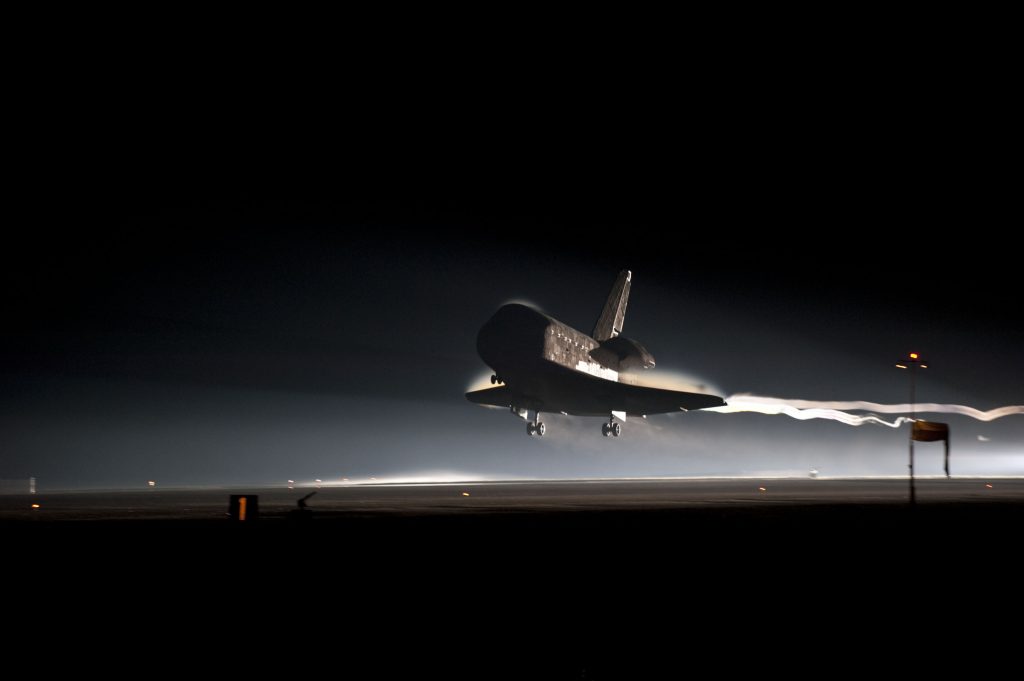
Dear Friend and Reader:
When the Space Shuttle Atlantis glided majestically through the early morning darkness and touched down at the Kennedy Space Center on Thursday, July 21, it landed on a different planet from the one Columbia first took off from in April 1981.
Atlantis landed on a hotter, more crowded planet, one engulfed in economic, environmental and ideological crisis. Even if we could afford it, it’s doubtful the religion-obsessed, anti-science, anti-progress politicians who dominate our current moment could muster the vision to develop something so technologically ambitious as a sustained manned space program — which may be a good thing.
We hail the Shuttle mission as a technological achievement, yet Atlantis is an appropriate name for a spacecraft returning to a world that cannot handle the power or responsibility of its own technology. We are very good at making things, and not so good at dealing with the consequences. We are great at making profits from industrial processes, but we don’t look ahead to what those processes might create in the way of consequences or costs to the future. Indeed, we act as if there are no consequences even as they pile up.
The last Shuttle returned to Earth through a more radioactive atmosphere, with its air and oceans more contaminated by a vast (and increasing) diversity of persistent toxins. It’s true that by 1981 the environmental situation was at a critical level, yet in three decades that crisis has grown exponentially. The number of chemicals being produced, and the amounts involved, are unconscionable. So too are the tons of plastic going into the oceans every day, and the dumping of solvents into the oceans to break down the millions of gallons of crude oil that are spilled into seawater every year.
Monster storms, extremes of temperature, rapidly melting ice caps, hurricanes, tornado supercells, earthquakes and droughts are more frequent, to the point where they now seem commonplace. In 1981, most people did not know what the word tsunami meant. They didn’t learn it by studying for the spelling bee. “Earth changes” were something you knew about if you studied Edgar Cayce. Now they are in The New York Times.
Many municipal water supplies are contaminated by the mood-altering drugs being used to quell what is in truth a mass-epidemic psychological crisis.
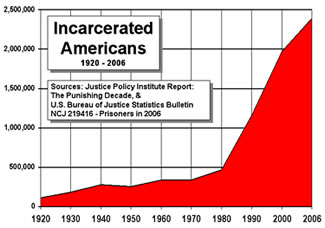
In 1981, there were 500,000 people in prison in the U.S. Today there are 2.5 million. The world population has increased by 50% during the same time, from 4.5 billion in 1981 to 6.75 billion today.
There is less fresh water left, as water tables are pumped dry for irrigation and animal production. Hydrofracking now contaminates otherwise good water supplies in communities eager to profit from our energy-hungry world. Today’s cars still run on the same basic principle as the Model A — an explosion of carbon fuel inside a cylinder.
In 1981, the national debt of the United States was about a trillion dollars; today it’s $14 trillion. Much of that money has gone for military purposes. Since 1981 (just a few years after we pulled out of Vietnam, Laos and Cambodia), the United States has fought in or been responsible for wars in El Salvador, Nicaragua, East Timor, Iraq, the Balkans, Afghanistan, Iraq (again) and Libya. The world is still rigged with nuclear bombs. Since the fall of the Soviet empire, many have gone missing. There are hundreds of thousands of tons of nuclear waste piling up with nowhere to go. This waste will be toxic for many millennia, and we have no dependable way to warn future people about it. Try reading script written in 1700. Try reading French if you’re German. Even if future civilizations understand our pictograms warning of danger, who’s to say curiosity won’t get the better of them?
The end of the 30-year Shuttle mission marks a phase in the history of human space exploration, but it also marks a distinct phase in history overall. In the early 1980s the Republican movement began its merger with the Christian movement, turning churches into political clubhouses and morphing the fundamentalist agenda with our supposed national priorities. That blend of agendas has resulted in the adoption of 80 state laws designed to restrict abortion rights in 2011 alone, all of which are based on religious ideology that amounts to a war on women.
In the spring of 1981, when Columbia took off, the U.S. schools — under the direction of the Reagan administration, with help from the Heritage Foundation — began a program of abstinence-only sex indoctrination. This created generations of young people whose most dependable source of sex education is now pornography. In the spring of 1981, the first articles about AIDS appeared in The New York Times. Since then, the number of people living with HIV has increased every year until 2009, the most recent year for which we have statistics.
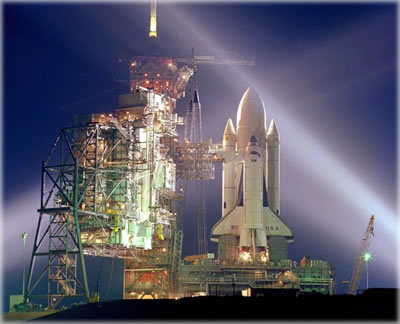
We are in a moment when we need the most enlightened leaders, with the broadest vision and sense of the future, yet we seem to have precisely the opposite: those driven by narrowness, fear and ideological obsession.
As I write, the United States is being backed against its debt limit by politicians who either don’t understand the concept of default, or who are too caught in their own apocalyptic visions to spare a rational thought for the safety of the world economy.
Well, we can add to that a third concurrent fact: they lack the maturity to negotiate. Every turning point is used as an opportunity to leverage total power.
While I am describing the world’s problems, which are really our problems, let’s add one more. During July, we in the United States finally caught wind of what has been happening to the news media throughout the English-speaking world (and much of Europe and Asia). The mental sphere was being contaminated by a company called News Corp, which subverted the primary mission of the press — to inform people — with a vast criminal enterprise funded and driven by a propaganda machine. To sum up, it seems like News Corp was designed to serve as the platform for every lie that anyone in power wanted to propagate. The problem has been metastasizing, and it appears that Rupert Murdoch & Co. used the information they had to run a kind of blackmail operation that led many people to stay quiet about how much political influence they really had.
Yet there are many layers of the issue that most people have yet to hear about, such as Murdoch’s role in building up the climate change denial movement. That Murdoch has fallen on hard times is some of the best news in these 30 years since Columbia first took off, a rare moment of transparency and an actual negative result of evil deeds befalling the one who was responsible. Yet the power vacuum that may be created by Murdoch’s fall is not automatically an improvement in our condition; two other things have to happen.
The first is that many people have to take on an increased role in accumulating and distributing valid, relevant information. The second is that many more people have to be interested in hearing about it. World crisis puts people into crisis, which has a way of eating their time and energy and making us less available to participate in change. In the 1960s the youths that participated in the antiwar and environmental movements were not working three jobs. Today the affluent ones who might be available often find themselves being entertained to death.

T.S. Eliot observed in 1936 that “human kind cannot bear very much reality,” though now we have more to bear than ever. Throughout history, most people have balked at exerting their influence on the greater scheme, and it doesn’t help that we’re consistently brainwashed to believe that having an influence is impossible.
It would be far easier for people to have an influence were that actually our agenda. Even when we’re working three jobs, we find the time to do at least some of the things that are important to us. If we opened up to the necessities at hand, we might be motivated to do something about them. But the choice to be informed and aware is strictly optional. That is the nature of free will. So while humanity has not been capable of dealing with very much reality — and T.S. Eliot was describing a very long span of time in that poem — it does not help when we are driven into psychological, emotional and spiritual crisis that paralyzes us further. We would be wise to see that strategy at work.
We are right to wonder how the people of the world are ever going to deal with the problems we face. We are right to wonder how we personally are ever going to muster the strength and focus. Obviously we cannot leave it to our ‘leaders’, who in the United States are obsessed with collective death and wrapping the female body in barbed wire, and who in the U.K. are getting drunk with corrupt newspaper reporters, the police and convicted private investigators. It might help if we didn’t rely on FOX News to tell us what to think, and to remind us constantly how powerless we are. It would help if we understood the concept of “giving up our power.”
Because the global crisis depends on individual crisis as a power source, and as a way of blocking solutions, then it’s clear that working to heal ourselves is a crucial step in any wide-scale solution. If we as individuals don’t feel better, and less overwhelmed, then there’s no way we can take on the challenges of the world. If we’re so busy fighting ourselves, and obsessing over petty sins, and demanding that certain people not get to go to the doctor when they need to, we’re obviously not joining together to do something about the problems we perceive. Therefore, working on individual healing is a necessary prerequisite to planetary healing.
That, however, can be a trap of its own. I have met many, many well-meaning people who do all kinds of things to make themselves ‘better’ people who still cannot muster the will power to take on something larger than their own life. I know many people obsessed with spirituality, yoga, attending self-improvement workshops (and so on) but who rarely participate in anything more than that. This has always mystified me, but maybe I’m a little naïve.
Self-indulgence presents a trap, and it’s often wrapped in the cloak of self-improvement. Inner work can be a sophisticated form of checking out. Participation takes time, energy, effort and often requires personal resources. You don’t usually get an expense account working as an activist. You have to figure out how to get to the demonstration, or how to fund your project, and taking on that responsibility is a dependable means of growth. On one significant level this is a question of one’s agenda. If you want to do something, usually you will figure out a way. If you have a goal that takes more than one person, it’s usually pretty easy to find others with the same goal — if you want to. Then of course you have to master the art of getting along with them. That desire might get you to go to therapy. This is different from “inner work.” There are no abstractions involved, but rather confronting practical realities that in turn improve your state of mind. You heal because you get a benefit from it, the benefit being you’re better able to participate in something creative, cooperating with others.

And this brings us back to the purpose of civilization itself. The first cuneiform writing was not created to publish romances or News of the World. It was developed so that one generation could pass the instructions for growing crops down to the next. We created writing not for personal expression but to ensure collective survival. Next time you see a cookbook, remember that’s from the oldest genre of literature.
What we seem to lack in our moment of history is the notion that there’s an intersection between individual needs and collective needs. We have a lot in common, but the obsession of business and government with privatization veils that fact. George Orwell once wrote that it was not possible for the wealthy to light the city streets for themselves but keep them dark for everyone else.
Today, you can count on people to figure out how to do just that. It’s silly because in most matters, collective benefit is efficient, and we invoke the concept of synergy. If we put some of our individual energy into a collective pool, we’ll be able to accomplish more and take care of many more people, at no loss to ourselves. Personally, I don’t find it appetizing when I’m eating to think that other people are starving. I prefer that everyone have food. Here, we can divine something from the current political agenda of no taxes / no social safety net / no care for the future. This agenda defies the notion of civilization itself: that if we need to stand up to the elements, if we need to make buildings to stay warm and dry, we simply must recognize that collective necessities have everything in common with individual necessities.
If we can get clear about that, we would understand that the reason we improve ourselves, and individuate, is specifically to expand into a collective experience. Most people don’t sit hour after hour and learn guitar chords merely for themselves or for the sake of doing it; eventually you want to play music for and with others. So when you take yoga and journey into the underworld and do five-day workshop intensives or read books about growing whole, ask yourself why you’re doing it, and remember — there actually is a reason. Action is the fruit of knowledge.
If we study the moment of history when the Shuttle Atlantis landed on Earth for the last time, we can learn a lot about ourselves. The thing we need to understand the most carefully is a central idea: the one that will tell us about our common interests. In terms of all the basics and many of the flourishes of life, we’re all in this together. There are some who suggest that the space program is a way off of the planet. One of them is the launch director for the last mission, Mike Leinbach. “The Shuttle program to me was an evolutionary step off the planet and into the heavens,” he said before the July 8 liftoff. “We have learned to live and work in low-Earth orbit. I think we as a species need to be thinking about living off this planet, long-term. That ought to be the mission.”
The problem with this approach is obvious, right?
Lovingly,
![]()
And Just What Was the Space Shuttle?
Before NASA put some guys on the Libra Moon (true fact: the Moon was in Libra when Neil Armstrong stepped out onto its surface 42 years ago yesterday), the space agency was thinking about reusable space vehicles. It had some pretty good development programs, including one for a vehicle that took off like an airplane, gradually went into orbit and then became a space ship. It used a lot less fuel than the spacecraft we see used today. They also didn’t punch a hole the size of a small city in the ozone layer, like the Shuttle did again and again.
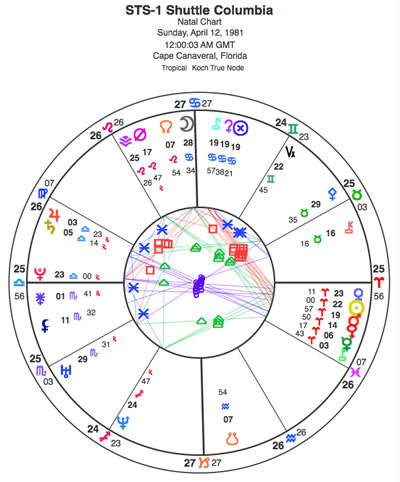
Ideas for low-energy, horizontal take-off ships were abandoned at the start of the Mercury and Apollo programs in favor of a one-time-use, vertical launch rocket eventually leading up to the familiar Saturn V that took humans to the Moon and back.
The Space Shuttle program was formally initiated by Richard Nixon in 1972, shortly before the Watergate scandal broke open and a year before the Apollo 17, the last flight in that program.
While NASA’s mission was always said to be civilian, it openly merged with the military for the Shuttle program. The thing is, the whole civilian image of NASA was just that — an image. The American space program was driven by Nazi technology imported at the end of World War II through something called Project Paperclip. The goal of the German space program involved putting nuclear weapons into space. While the Mercury, Apollo and SkyLab programs were soft peddled as being about pure science, and funded as such, underneath they were driven by military values and a blatant military agenda.
When it came time to do the Shuttle, NASA knew that its continued funding depended on the deeper pockets of the military rather than the relatively poorly financed world of academic science.
“The Shuttle was 50/50 all along. It wasn’t totally military, or totally civilian. That was the problem,” said Karl Grossman, author of Weapons in Space and The Wrong Stuff, a book about the nuclear implications of the American space program. [Read Dr. Grossman’s newest article on Planet Waves.]
“The military compromised the whole program. They wanted the huge cargo bay to be able to service military assets in space, which would include weapons in space. That’s why they did it the way they did it, with the large cargo bay. I would say half the missions were military missions. Some involved reconnaissance up in space, mapping, and God knows what else. Those were the missions where you had seven colonels flying into orbit.” Think about that for a second — colonel is one rank below general.
I would say that the pure-science aspect was merely PR gloss for the military aspect. This overwhelmingly military theme is confirmed in the chart for the first launch in a way so glaring it would be funny if it didn’t involve a plan to wipe out mass populations with space-based weapons. In the chart for the first Shuttle launch, notice all those planets on the right side, just below the horizon. Those planets are all in Aries, a sign associated with Mars, the god of war, and of aggression in general. And they are in the 6th house — the house of military service. Aries in the 6th is about as military as you can get. They include Mars and Eris (in a conjunction), siblings who in various myths were responsible for quite a bit of warfare.
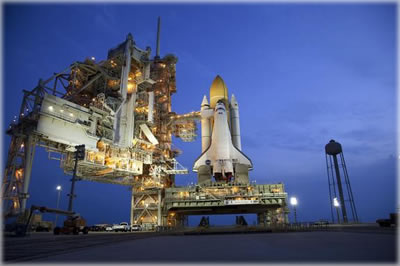
Those planets are opposed by Pluto, which emphasizes the point. Pluto is in Libra, lurking in the 12th house of the chart, a kind of veiled zone. There is a hidden agenda, and it seems to involve something nuclear, such as plutonium (a lot of which has been put into space). It is precisely opposite Venus (the ascendant ruler). By precisely I mean to 1/6th of a degree, which blends Pluto and Venus into one concept.
We can only guess what all those colonels and other well-decorated officers were doing up there all those long days and nights in orbit, and just what was sent up in the cargo bay of that big bird. Yes, we get a lot of pretty pictures from the Hubble telescope, but the price to humanity has been pretty high.
Some comments from the military can give us a clue that the original intent of going into space at all — nuclear weapons in space — was in fact the agenda. Why nuclear weapons? They power the space-based lasers that Ronald Reagen was all excited about. And to my thinking, if the HAARP program exists (which it does) then its orbital components were installed during Shuttle missions. Here you have it in the military’s own words.
Gen. Joseph Ashy, commander-in-chief of the U.S. Space Command, said in 1996: “It’s politically sensitive, but it’s going to happen. Some people don’t want to hear this, and it sure isn’t in vogue, but — absolutely — we’re going to fight in space. We’re going to fight from space and we’re going to fight into space. That’s why the U.S. has development programs in directed energy and hit-to-kill mechanisms. We will engage terrestrial targets someday — ships, airplanes, land targets — from space.”
And in a 1999 publication called New World Vistas, the Air Force said, “In the next two decades, new technologies will allow the fielding of space-based weapons of devastating effectiveness to be used to deliver energy and mass as force projection in tactical and strategic conflict. These advances will enable lasers with reasonable mass and cost to effect very many kills.”
It is tempting to be caught in the romance of space travel, and to respect the bold spirits of those who risked their lives to sit on top of 535,000 gallons of liquid rocket fuel as they light the thing up for launch. It’s tempting to get caught in the Buck Rogers image of men in space, and to confuse it with the peaceful mission of the starship Enterprise. Unfortunately, the Space Shuttle was not science fiction. It was science fact, and after 133 successful missions (two ended badly, but that’s still a lot of trips into orbit; think about it), we can only speculate what kinds of weapons systems are now orbiting our planet, or what anyone plans to do with them. It is little comfort that these systems are not exactly in the hands of the wise and the enlightened, but those whose careers are driven by subterfuge and the quest for power.
 Aries (March 20-April 19) — You are at a leverage point where you can make progress on connecting your financial goals to your creative flow. While you’re doing this, you might ponder why, or perhaps how, it is that so many people find this so mysterious. Is there really any way to create or attract wealth other than creativity? One of the unfortunate elements of Western thought to get over is that there is some other way. Since you don’t look like you’re becoming a bank robber any time soon, I suggest you consider the idea that — for you, anyway — there’s just one practical way to fund your life, which is with the thoughts that emerge from your mind, the products of your hands, and your vital participation in the world. I wonder, does that match your view of yourself? What would you need to do or adjust in your life in order to get over any lingering anxiety or outright fear about money, creativity or both? Now is a great time.
Aries (March 20-April 19) — You are at a leverage point where you can make progress on connecting your financial goals to your creative flow. While you’re doing this, you might ponder why, or perhaps how, it is that so many people find this so mysterious. Is there really any way to create or attract wealth other than creativity? One of the unfortunate elements of Western thought to get over is that there is some other way. Since you don’t look like you’re becoming a bank robber any time soon, I suggest you consider the idea that — for you, anyway — there’s just one practical way to fund your life, which is with the thoughts that emerge from your mind, the products of your hands, and your vital participation in the world. I wonder, does that match your view of yourself? What would you need to do or adjust in your life in order to get over any lingering anxiety or outright fear about money, creativity or both? Now is a great time.
 Taurus (April 19-May 20) — I suggest you spend some time trying on the feeling of being more fortunate than you think you are. This may feel like an exaggeration — go for it. Don’t imagine the cup is half full; imagine the cup is overflowing, and that you’re strolling down your favorite street of your favorite city in any style you like. Allow yourself to think and indeed to feel like your life exists on a larger scale than it does. I suggest, specifically, that you allow yourself to feel safe being more, and having more, as both an experiment and a kind of exercise. If you can get over the feeling that it’s somehow silly to do this, you may discover that the way into success is to allow your mind to expand and make room for it, so that you have space to grow into. Small feelings and thoughts lead to a cramped life; more expanded, generous thoughts lead to a more spacious, abundant life.
Taurus (April 19-May 20) — I suggest you spend some time trying on the feeling of being more fortunate than you think you are. This may feel like an exaggeration — go for it. Don’t imagine the cup is half full; imagine the cup is overflowing, and that you’re strolling down your favorite street of your favorite city in any style you like. Allow yourself to think and indeed to feel like your life exists on a larger scale than it does. I suggest, specifically, that you allow yourself to feel safe being more, and having more, as both an experiment and a kind of exercise. If you can get over the feeling that it’s somehow silly to do this, you may discover that the way into success is to allow your mind to expand and make room for it, so that you have space to grow into. Small feelings and thoughts lead to a cramped life; more expanded, generous thoughts lead to a more spacious, abundant life.
 Gemini (May 20-June 21) — You seem to be in the process of making a decision about whether you feel right where you are, and by that I mean domestically (in your home), geographically (in your city or region) or both. Just make sure that you distinguish the logical piece (what you’re thinking, or what your mind is telling you) from the sensory and intuitive piece (what you’re feeling, and what your instincts are telling you). You have some time to sort this out; I suggest you not try to convince yourself of anything, and set a boundary on how long you’re going to ponder this issue. On the surface, it seems like the primary issue is your sense of safety. Really, I think you’re grappling with a sense of belonging: do you belong where you are? Do you feel grounded? Your mind and your body may have two different opinions about this, and the next six weeks or so will help you work out any differences you find. PS, one other clue: what if the past was not such a potent factor?
Gemini (May 20-June 21) — You seem to be in the process of making a decision about whether you feel right where you are, and by that I mean domestically (in your home), geographically (in your city or region) or both. Just make sure that you distinguish the logical piece (what you’re thinking, or what your mind is telling you) from the sensory and intuitive piece (what you’re feeling, and what your instincts are telling you). You have some time to sort this out; I suggest you not try to convince yourself of anything, and set a boundary on how long you’re going to ponder this issue. On the surface, it seems like the primary issue is your sense of safety. Really, I think you’re grappling with a sense of belonging: do you belong where you are? Do you feel grounded? Your mind and your body may have two different opinions about this, and the next six weeks or so will help you work out any differences you find. PS, one other clue: what if the past was not such a potent factor?
 Cancer (June 21-July 22) — You may be feeling out of step as the Sun leaves your sign, as if you are somehow adrift in a world of possibilities you cannot seem to grasp. I suggest you set a boundary around yourself, and explore within a smaller sphere of reality than you might ordinarily. In a sense, I’m suggesting you experiment with a limit, which could be your backyard, it could be a phase of time that you define, it could be a group of friends, or it could be a purpose that you’ve embraced. When you’re consciously existing within that enclosed (or clearly defined) space, how do you feel? The world is indeed large and wild, and there are a lot of possibilities. I suggest you experiment with seeing the potential that already exists within you. I also suggest you experiment with being content and comfortable within that self-imposed limit or idea, at least for a little while. There’s more available for you in there than you may imagine.
Cancer (June 21-July 22) — You may be feeling out of step as the Sun leaves your sign, as if you are somehow adrift in a world of possibilities you cannot seem to grasp. I suggest you set a boundary around yourself, and explore within a smaller sphere of reality than you might ordinarily. In a sense, I’m suggesting you experiment with a limit, which could be your backyard, it could be a phase of time that you define, it could be a group of friends, or it could be a purpose that you’ve embraced. When you’re consciously existing within that enclosed (or clearly defined) space, how do you feel? The world is indeed large and wild, and there are a lot of possibilities. I suggest you experiment with seeing the potential that already exists within you. I also suggest you experiment with being content and comfortable within that self-imposed limit or idea, at least for a little while. There’s more available for you in there than you may imagine.
 Leo (July 22-Aug. 23) — The Sun enters your birth sign this weekend, and I’m guessing that always comes as a relief. This is the season of your birth, and for as strange as life on the only known inhabited planet is right now, you can welcome a sense of familiarity and a drop in psychic pressure. For the past couple of months there has been a lot going on behind the scenes of your life, and you might discover that many of the situations and issues you were working with have resolved themselves. I suggest you focus your energy on coming to terms with one particular fear that has been more persistent. Now is the time to develop an understanding of the source of the feeling, as well as build some confidence that it’s something that cannot actually hurt you. One advantage to the current moment is that you can actually get the sensation into your direct vision and see it for what it is. This information will come in handy in the near future.
Leo (July 22-Aug. 23) — The Sun enters your birth sign this weekend, and I’m guessing that always comes as a relief. This is the season of your birth, and for as strange as life on the only known inhabited planet is right now, you can welcome a sense of familiarity and a drop in psychic pressure. For the past couple of months there has been a lot going on behind the scenes of your life, and you might discover that many of the situations and issues you were working with have resolved themselves. I suggest you focus your energy on coming to terms with one particular fear that has been more persistent. Now is the time to develop an understanding of the source of the feeling, as well as build some confidence that it’s something that cannot actually hurt you. One advantage to the current moment is that you can actually get the sensation into your direct vision and see it for what it is. This information will come in handy in the near future.
 Virgo (Aug. 23-Sep. 22) — Many of your best attributes are hidden from plain view. You may even walk around with the sense that if people could only see you for who you really are, they would be amazed. But you’re the one who deserves to be amazed: by what you possess within yourself, by what you’re capable of, and by what you want to share with the world. I’m wondering what could be standing between you and your full expression. One hint that the charts are offering is that you’re uneasy about power. Offering your strength or creativity is indeed a kind of power. There is a risk involved, and though I’m uncertain where it comes from, you seem to carry some anxiety around the whole theme of aggression. It’s as if you feel that when you start to let go and assert your potential, you are somehow being pushy or even violent. You are currently in a moment when you can experiment with having absolutely no fear of that; where you can assert yourself a little more strongly and be confident that you’re safe doing so.
Virgo (Aug. 23-Sep. 22) — Many of your best attributes are hidden from plain view. You may even walk around with the sense that if people could only see you for who you really are, they would be amazed. But you’re the one who deserves to be amazed: by what you possess within yourself, by what you’re capable of, and by what you want to share with the world. I’m wondering what could be standing between you and your full expression. One hint that the charts are offering is that you’re uneasy about power. Offering your strength or creativity is indeed a kind of power. There is a risk involved, and though I’m uncertain where it comes from, you seem to carry some anxiety around the whole theme of aggression. It’s as if you feel that when you start to let go and assert your potential, you are somehow being pushy or even violent. You are currently in a moment when you can experiment with having absolutely no fear of that; where you can assert yourself a little more strongly and be confident that you’re safe doing so.
 Libra (Sep. 22-Oct. 23) — Isn’t it weird how attached people get to their religious beliefs, even to the point of enforcing them with laws, judges and police? And when you think about most religious beliefs, they are based on very little, or absolutely nothing — which may be why so many people feel like they have to be so pushy about them. This works with many other kinds of beliefs, such as in sex roles, social roles, with money, or with a worldview. The current moment is all about belief melting away and the presence of something real making itself known. The presence may not be obvious; in fact it may be subtle, such as something that was there all along but which you’re just noticing now. You will notice more elegantly if you let go of belief, arguing about belief, or trying to convince yourself (or anyone) of anything. The truth that will emerge from the background of your perception is more likely to express itself in an atmosphere of relative calm, with your mind in observer mode.
Libra (Sep. 22-Oct. 23) — Isn’t it weird how attached people get to their religious beliefs, even to the point of enforcing them with laws, judges and police? And when you think about most religious beliefs, they are based on very little, or absolutely nothing — which may be why so many people feel like they have to be so pushy about them. This works with many other kinds of beliefs, such as in sex roles, social roles, with money, or with a worldview. The current moment is all about belief melting away and the presence of something real making itself known. The presence may not be obvious; in fact it may be subtle, such as something that was there all along but which you’re just noticing now. You will notice more elegantly if you let go of belief, arguing about belief, or trying to convince yourself (or anyone) of anything. The truth that will emerge from the background of your perception is more likely to express itself in an atmosphere of relative calm, with your mind in observer mode.
 Scorpio (Oct. 23-Nov. 22) — You’re about to get the answer to a mystery — you might say, the mystery of where your power goes. I mean, you must have figured out that it goes somewhere, because you can go from being influential and creative in the flow of your life, to suddenly being subsumed in another person or a situation larger than you. This can and often does happen so dependably that you don’t even notice it at the time. Yet you’re embarking on a turn of events that are poised to give you a big clue what happens when you suddenly discover you have no influence. I think you’ll catch yourself before things go too far — that’s the whole point. This arrives not a moment too soon, because with the Sun about to enter Leo, you have everything going for you right now. You are visible, you’re perceived as competent and qualified as you are, and this is a moment to shine, especially in the work that you do.
Scorpio (Oct. 23-Nov. 22) — You’re about to get the answer to a mystery — you might say, the mystery of where your power goes. I mean, you must have figured out that it goes somewhere, because you can go from being influential and creative in the flow of your life, to suddenly being subsumed in another person or a situation larger than you. This can and often does happen so dependably that you don’t even notice it at the time. Yet you’re embarking on a turn of events that are poised to give you a big clue what happens when you suddenly discover you have no influence. I think you’ll catch yourself before things go too far — that’s the whole point. This arrives not a moment too soon, because with the Sun about to enter Leo, you have everything going for you right now. You are visible, you’re perceived as competent and qualified as you are, and this is a moment to shine, especially in the work that you do.
 Sagittarius (Nov. 22-Dec. 22) — When the Sun enters Leo this weekend, it picks up on a load of fiery energy that’s concentrated in both Aries and your own sign. This seems custom-designed to give you momentum, and it will — but I suggest you be aware of one thing. What you might currently think of as a highly focused goal may be changing. That’s a good thing, not a bad thing. The result will be an opportunity to expand your horizons in a way that you’ve been lacking for a while. Expanding may come in the form of new space, new ideas, or new locations, perhaps at a distance. Whatever may emerge, it’s time to stretch out of your familiar territory and reach into different possibilities than the ones that have surrounded you for many months. You may have an idea to return to someplace you’ve been before. This would not be a step back, or backwards — rather, you would arrive there and see it as an entirely new place.
Sagittarius (Nov. 22-Dec. 22) — When the Sun enters Leo this weekend, it picks up on a load of fiery energy that’s concentrated in both Aries and your own sign. This seems custom-designed to give you momentum, and it will — but I suggest you be aware of one thing. What you might currently think of as a highly focused goal may be changing. That’s a good thing, not a bad thing. The result will be an opportunity to expand your horizons in a way that you’ve been lacking for a while. Expanding may come in the form of new space, new ideas, or new locations, perhaps at a distance. Whatever may emerge, it’s time to stretch out of your familiar territory and reach into different possibilities than the ones that have surrounded you for many months. You may have an idea to return to someplace you’ve been before. This would not be a step back, or backwards — rather, you would arrive there and see it as an entirely new place.
 Capricorn (Dec. 22-Jan. 20) — There is an opening in your life that did not exist a month ago, and you can go through that opening and explore an unfamiliar world. This is likely to be in the form of a relationship. It could be a new person, or an experience of someone currently in your life that is ready to open up in a new way. I suggest you let the experience attract you, and draw you toward it — rather than plunging in, not knowing what you’re getting yourself into. Easy does it; this is gentle territory. Stay close to the feeling of what you don’t know; stay close to the subtle curiosity that may be leading you. If you find yourself losing confidence, stay close to your curiosity and treat it like it’s emotional oxygen. Feel the sensation of not knowing, and loving the anticipation of discovery.
Capricorn (Dec. 22-Jan. 20) — There is an opening in your life that did not exist a month ago, and you can go through that opening and explore an unfamiliar world. This is likely to be in the form of a relationship. It could be a new person, or an experience of someone currently in your life that is ready to open up in a new way. I suggest you let the experience attract you, and draw you toward it — rather than plunging in, not knowing what you’re getting yourself into. Easy does it; this is gentle territory. Stay close to the feeling of what you don’t know; stay close to the subtle curiosity that may be leading you. If you find yourself losing confidence, stay close to your curiosity and treat it like it’s emotional oxygen. Feel the sensation of not knowing, and loving the anticipation of discovery.
 Aquarius (Jan. 20-Feb. 19) — Here is some news: This week, a spacecraft originating on Earth traveled 117 million miles, reached an asteroid for the first time, entered an orbit around the thing, and sent home photos. The ship is called Dawn and the asteroid is Vesta, who I think of as the guardian of ‘the sacred space of self’. This took place in your birth sign, which at the very least is an astrological honor. But I think it’s more than that. Vesta is a representation of interior consciousness, a dimension that eludes many people most of their lives. This stark metaphor of a long journey to a remote location, and images traveling back to us over that vast distance, suggests that you’re making a discovery. It may be as simple as coming fully to terms with the existence of your inner universe. You don’t have to concern yourself with what that means; you can look within your consciousness with wonder and appreciation.
Aquarius (Jan. 20-Feb. 19) — Here is some news: This week, a spacecraft originating on Earth traveled 117 million miles, reached an asteroid for the first time, entered an orbit around the thing, and sent home photos. The ship is called Dawn and the asteroid is Vesta, who I think of as the guardian of ‘the sacred space of self’. This took place in your birth sign, which at the very least is an astrological honor. But I think it’s more than that. Vesta is a representation of interior consciousness, a dimension that eludes many people most of their lives. This stark metaphor of a long journey to a remote location, and images traveling back to us over that vast distance, suggests that you’re making a discovery. It may be as simple as coming fully to terms with the existence of your inner universe. You don’t have to concern yourself with what that means; you can look within your consciousness with wonder and appreciation.
 Pisces (Feb. 19-March 20) — In our world, we must come to terms with the conflation of sexual desire and violence. We don’t like to think of it this way, but there is a relationship between the two, it has many expressions, and we all experience them in one way or another. There’s an element to your astrology this week that reminds me of a drain of violent impulses from your emotional body. The chart feels as if pressure is being released from your psyche, and one way that can express itself is the healing of dualism. Part of what pushes sexual feelings into a violent dimension, and indeed all of human emotion, is the perception of difference, which extends one more layer into duality — an us versus them feeling, or me versus the world. The challenge of your current astrology is about relaxing and experiencing some element of the common ground we all share, from moment to moment. This will offer you a whole new way of exploring pleasure and desire.
Pisces (Feb. 19-March 20) — In our world, we must come to terms with the conflation of sexual desire and violence. We don’t like to think of it this way, but there is a relationship between the two, it has many expressions, and we all experience them in one way or another. There’s an element to your astrology this week that reminds me of a drain of violent impulses from your emotional body. The chart feels as if pressure is being released from your psyche, and one way that can express itself is the healing of dualism. Part of what pushes sexual feelings into a violent dimension, and indeed all of human emotion, is the perception of difference, which extends one more layer into duality — an us versus them feeling, or me versus the world. The challenge of your current astrology is about relaxing and experiencing some element of the common ground we all share, from moment to moment. This will offer you a whole new way of exploring pleasure and desire.



